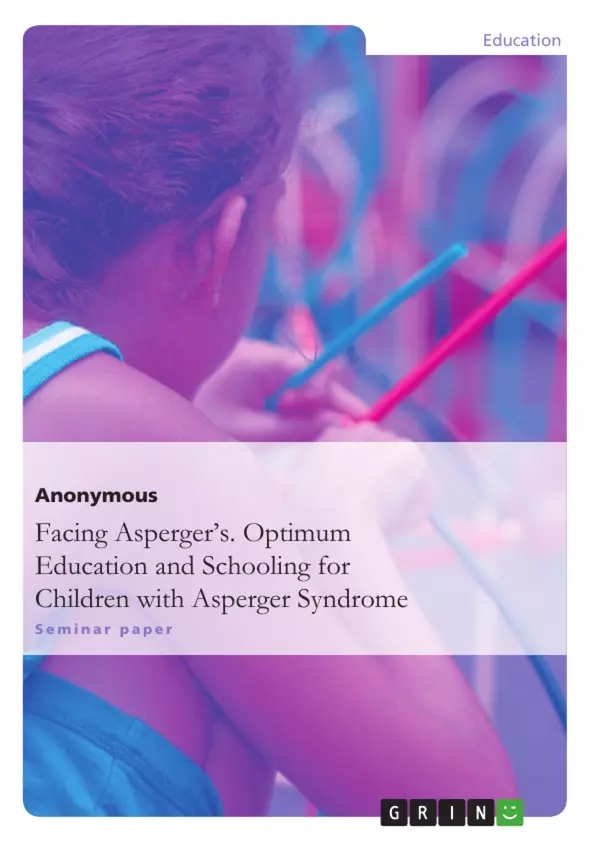"Asperger: a syndrome between autism and normality" / "The Oops-Wrong-Planet syndrome". Both terms describe the same syndrome. The affected children oscillate between the poles of normality and otherness and try to find a place in society in their own way and with their own needs and abilities.
Their intellectual potential often makes them capable of going to a regular school – however, their particular social and communication behavior alters their social interactions with the others: consequently, the daily school routine of many children is associated with tension and mishaps. It often occurs that they become socially isolated and inappropriately encouraged, so they can neither develop their talents nor keep positive memories of their school time.
The future inclusive school has the task of adopting all children without any hierarchy and satisfying the individual needs of each. However, how can the inclusive school be conceived as a pleasant place and associated with success from the viewpoint of these children? Under what conditions can it adjust to their exceptionality and encourage them in a productive way?
These are the research questions that will be driving this work. They attempt to analyze the daily school routine from “aspergic” perspectives and reveal the conditions for adequate learning programs and a successful school experience for these children. First of all, the diagnostic classification of the traits of the Asperger syndrome is analyzed with its potential implications in the daily routine of the children, since they determine the educational measures.
Concluding the work, further important building blocks for the future inclusive school to be attended will be approached and commented upon from my point of view as a teacher.
Inhaltsverzeichnis (Table of Contents)
- Introduction
- Definitions: what is the Asperger syndrome?
- Characteristics of the Asperger syndrome
- Communication, interaction and empathy
- Speech and body language
- Interests and activities
- Perception and sensory overload
- Children with Asperger syndrome in school
- Recommendations of the conference of the ministry of culture…...
- The construction of school as space for living and learning ..
- Organisation
- Classes
- Work behavior
- Social relations
- Additional support in school
- The inclusive school: building blocks for successful study for all children……......
- Commentary
Zielsetzung und Themenschwerpunkte (Objectives and Key Themes)
This work aims to analyze the daily school routine from the perspective of children with Asperger syndrome and identify the conditions for adequate learning programs and a successful school experience for them. It seeks to understand how the inclusive school can be conceived as a pleasant and successful environment for these children, considering their unique needs and abilities.
- Diagnostic classification of Asperger syndrome and its implications for daily school routines
- Challenges faced by children with Asperger syndrome in the traditional school environment
- The role of the inclusive school in meeting the needs of children with Asperger syndrome
- Building blocks for successful study for all children in an inclusive school setting
- The importance of creating a supportive and understanding environment for children with Asperger syndrome
Zusammenfassung der Kapitel (Chapter Summaries)
- Introduction: Introduces the concept of Asperger syndrome and its impact on children's school experience. It highlights the challenges faced by these children in traditional school settings and sets the stage for the research questions explored in the work.
- Definitions: what is the Asperger syndrome?: Provides a comprehensive definition of Asperger syndrome, tracing its historical development and its place within the autism spectrum. It clarifies the differences between Asperger syndrome and other forms of autism, such as early childhood autism and atypical autism.
- Characteristics of the Asperger syndrome: Explores the key characteristics of Asperger syndrome, including communication, interaction, empathy, speech, body language, interests, activities, and perception. It discusses the challenges these characteristics present for children with Asperger syndrome in their social and academic lives.
- Children with Asperger syndrome in school: Examines the experiences of children with Asperger syndrome in the school environment. It explores the recommendations from the ministry of culture and discusses the construction of school as a space for living and learning.
- The inclusive school: building blocks for successful study for all children……......: Discusses the importance of inclusive education for children with Asperger syndrome and outlines key elements for building a successful and supportive learning environment for all students.
Schlüsselwörter (Keywords)
Asperger syndrome, autism spectrum, inclusive education, school environment, learning programs, social interaction, communication, empathy, sensory overload, support, building blocks for successful study.
Frequently Asked Questions
What is the "Oops-Wrong-Planet" syndrome?
It is a term used to describe Asperger syndrome, highlighting the feeling of affected individuals that they don't quite fit into the social "norms" of the world around them.
Can children with Asperger syndrome attend regular schools?
Yes, their intellectual potential often allows them to attend regular schools, but they require specific support due to challenges in social interaction and communication.
What is sensory overload in the context of Asperger's?
Many children with Asperger's experience sensory stimuli (noise, light, touch) more intensely than others, which can lead to stress and tension in a busy school environment.
What are the goals of an inclusive school for these children?
An inclusive school aims to accommodate all children regardless of their differences, providing a supportive environment where talents can be developed without social isolation.
How can empathy be a challenge for Asperger students?
Difficulty in reading non-verbal cues and body language can make it hard for them to intuitively understand the feelings of others, affecting their social relations.
- Quote paper
- Anonym (Author), 2012, Facing Asperger’s. Optimum Education and Schooling for Children with Asperger Syndrome, Munich, GRIN Verlag, https://www.grin.com/document/302870



